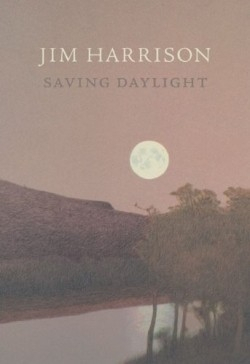It looks like you've stumbled upon a page meant to be read by our code instead of viewed directly. You're probably looking for this page.
Saving Daylight
In the author’s long and distinguished career, he has published more than two dozen books of poetry, fiction, and nonfiction. His best-known work may be the Western novella Legends of the Fall, which was made into a popular if rather conventional film, but the poems in this collection are far from formulaic.
Like his friend Ted Kooser (Copper Canyon also published Braided Creek, their “conversation in poetry”), Harrison begins his poems in everyday moments and events, and they are thick with birds, dogs, food, and drink. But at the heart of his work is an extravagance that resists easy explanation. It is not surrealist, exactly, but something closer to a kind of gruff and deeply grounded mysticism. “Reading Calasso” opens with a brilliantly unassuming surprise: “I’m the pet dog of a family of gods / who never gave me any training.” “Birds Again” is equally surprising: “The very alive souls of thirty-five hundred dead birds / are harbored in my body.” Even a relatively simple poem called “Diabetes” begins with the pin-prick of a test for blood sugar, but manages effortlessly to incorporate vampirism, John Kennedy’s assassination, and sheep killed by wolves near Harrison’s Montana cabin—all in thirty or so lines.
The range of Harrison’s poems reflects the wideness of his thinking and his life—he divides his time between Montana and a ranch near Mexico. Often the poems, especially the longer ones, incorporate reflection and aphorism as well as close observation and narrative: “The women we’ve mistreated / never forgive us nor should they,” (“Angry Women”); “We’re surely creatures with unknown gods” (“Waves”).
The collection includes Harrison’s translation of a poem “probably by Pablo Neruda” and, more unusual, four of his poems are presented both in English and in Spanish translations by William Barillas and Maria Ghiggia. Perhaps the motive is in the opening lines of “Spanish”: “For years I’ve believed the world should speak Spanish. … God e-mailed me that sex would be better in Spanish …” Remarkable among these poems is “The Old Days,” which plays in marvelous ways with nostalgic conventions: “Money didn’t grow in the leaves of trees but around / the trunks in calf’s leather money belts, / though you could only take twenty bucks a day.”
Some prolific writers eventually settle into predictability or self-parody, or exhaust themselves trying desperately to re-invent themselves with each new book. Somehow Harrison has managed to avoid all of these perils. The only thing predictable about this book is that each poem offers some unexpected reward.
Disclosure: This article is not an endorsement, but a review. The publisher of this book provided free copies of the book to have their book reviewed by a professional reviewer. No fee was paid by the publisher for this review. Foreword Reviews only recommends books that we love. Foreword Magazine, Inc. is disclosing this in accordance with the Federal Trade Commission’s 16 CFR, Part 255.
